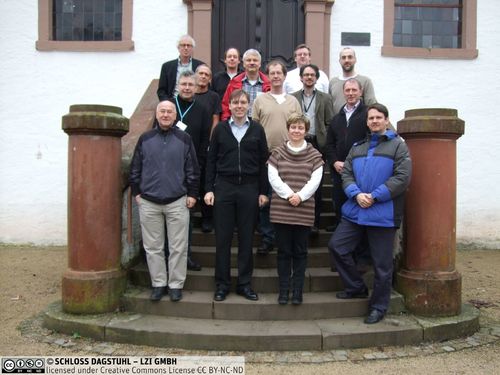Dagstuhl-Seminar 11042
Learning from the Past: Implications for the Future Internet and its Management?
( 25. Jan – 28. Jan, 2011 )
Permalink
Organisatoren
- Gabi Dreo Rodosek (Universität der Bundeswehr - München, DE)
- Aiko Pras (University of Twente, NL)
- Henning Schulzrinne (Columbia University - New York, US)
- Burkhard Stiller (Universität Zürich, CH)
Kontakt
- Simone Schilke (für administrative Fragen)
The attendees of the seminar discussed a hot topic of various research initiatives, namely the Future Internet, and its management. Can we make assumptions for the Future Internet if we question ourselves how the present Internet needs to be re-engineered by analyzing its current major limitations? Although discussions like the clean-slate vs. evolutionary approach are taking place, and are certainly vision-based, an alternative approach to investigate why certain decisions failed or succeeded seems to be promising as well.
Looking back, we recognize that the Internet architecture and protocols are, in theory, defined by about 5000 RFCs (``standards"), but in practice depend on a much smaller number of core assumptions, protocols and technologies. The Internet is largely defined by a modest set of protocols with numerous extensions and modifications: IPv4 and IPv6 at the network layer, UDP and TCP at the transport layer, and a handful of standardized and a large number of proprietary application protocols, for applications from email and file transfer to gaming. Along with these data-delivering protocols, control plane protocols such as BGP, configuration protocols such as DHCP and management protocols such as SNMP are needed to keep the Internet running.
Many of these protocols are now at least a decade, in some cases three decades, old. Some have aged gracefully; others clearly have reached the end of their useful lifetime. Also, numerous other protocols and architectures have been proposed in the literature and many were even standardized over the past decades, but most have had very limited or no practical impact. Unfortunately, the design of new protocols is still largely based on folklore and ideas passed on informally during discussions at conferences, IETF standardization meetings and PhD seminars. It is relatively easy to stuff all ideas accumulated into a new protocol, but it seems much harder to destil the lessons learned into future designs, so that we do not loose some of the core properties that have made the Internet successful. Not only in the design of protocols, the same is true also for the development of management approaches. Although it seems that we have recognized that the management of the Future Internet needs to be addressed in the design phase, it is largely ignored so far, maybe because we do not know how to approach it.
Therefore, learning from the past would give us valuable insights for the design of the Future Internet, and its management. The goal of the seminar was to discuss these questions and identify the key findings.
- Carsten Bormann (Universität Bremen, DE) [dblp]
- Georg Carle (TU München, DE) [dblp]
- Prosper Chemouil (France Telecom - Issy Les Moulineaux, FR)
- Hermann de Meer (Universität Passau, DE) [dblp]
- Gabi Dreo Rodosek (Universität der Bundeswehr - München, DE) [dblp]
- Olivier Festor (INRIA Lorraine - Nancy, FR) [dblp]
- Brendan Jennings (Waterford Institute of Technology, IE)
- Sape J. Mullender (Alcatel-Lucent Bell Labs - Antwerp, BE) [dblp]
- Aiko Pras (University of Twente, NL) [dblp]
- Danny Raz (Technion - Haifa, IL) [dblp]
- Ramin Sadre (University of Twente, NL) [dblp]
- Jürgen Schönwälder (Jacobs Universität - Bremen, DE) [dblp]
- Peter Schoo (Fraunhofer AISEC - München, DE)
- Henning Schulzrinne (Columbia University - New York, US) [dblp]
- Burkhard Stiller (Universität Zürich, CH) [dblp]
Verwandte Seminare
- Dagstuhl-Seminar 09052: Management of the Future Internet (2009-01-27 - 2009-01-30) (Details)
Klassifikation
- networks / world wide web
- internet
Schlagworte
- Networks
- Future Internet
- IT management challenges


